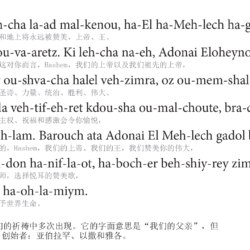the Open Siddur Project ✍︎ פְּרוֹיֶּקט הַסִּדּוּר הַפָּתוּחַ
a community-grown, libre Open Access archive of Jewish prayer and liturgical resources
This project is sustained through reciprocity for those sharing prayers and crafting their own prayerbooks.
Get Involved ✶ Upload Work ✶ Donate ✶ Giftshop בסיעתא דשמיא |
☰︎ Menu | 🔍︎
Search // Main //
🖖︎ Prayers & Praxes // 🌞︎ Prayers for the weekday, Shabbat, and season // Everyday // Daytime // Psukei D'zimrah/Zemirot
Psukei D’zimrah/Zemirot יִשְׁתַּבַּח שִׁמְךָ | 我们的王,你的名 | Yishtabaḥ Shimkha (Wǒmen de wáng, nǐ de míng) — Chinese translation by Richard Collis (2022)This Chinese translation of an Ashkenazi nusaḥ for “Yishtabaḥ,” the blessing concluding the Zemirot/Psuqei d’Zimrah is found on page 3 of the liner notes for the Chinese edition of Richard Collis’s album We Sing We Stay Together: Shabbat Morning Service Prayers (Wǒmen gēchàng, wǒmen xiāngjù — Ānxírì chén dǎo qídǎo). . . . A paraliturgical reflection of Ashrei for a shame resilience practice. . . . A paraliturgical reflection of the prayer Barukh She’amar for a shame resilience practice. . . . Rabbi Zalman Schachter-Shalomi, z”l, included his translation of “Yehi Kh’vod” in his Siddur Tehillat Hashem Yidaber Pi (2009). To the best of my ability, I have set his translation side-by-side with the verses comprising the piyyut. . . . This English translation by Rabbi Zalman Schachter-Shalomi z”l of “Barukh Sh’amar,” was first published in his Siddur Tehillat Hashem Yidaber Pi (2009). Linear associations of this translation according to the nusaḥ ha-ARI z”l by Aharon Varady. . . . אַתָּה־הוּא וְאָז יָשִׁיר (מקוצר) | Atah Hu and a condensed Az Yashir, adapted and translated by Rabbi Zalman Schachter-ShalomiRabbi Zalman Schachter-Shalomi, z”l, included his translation of נחמיה ט׃ו-י (Neḥemyah 9:6-10) in his Siddur Tehillat Hashem Yidaber Pi (2009). . . . ברוך ה׳ לעולם | Barukh Hashem l’Olam :: Bless Yah Always, translated by Rabbi Zalman Schachter-ShalomiIn the daily Shaḥarit (morning) psukei dzemirah service, this centos completes the reading of Psalms 145-150 and precedes the reading of Vayivarekh David” (1 Chronicles 29:10-13). Rabbi Zalman Schachter-Shalomi, z”l, included his translation of the linked verse piyyut, “Barukh YHVH (Hashem) L’Olam” in his Siddur Tehillat Hashem Yidaber Pi (2009). . . . Rabbi Zalman Schachter-Shalomi, z”l, included his adaptation of the liturgy for the final section of liturgy from the Pesukei Dezimrah, “Yishtabaḥ Shimkha,” in his Siddur Tehillat Hashem Yidaber Pi (2009). . . . יִשְׁתַּבַּח שִׁמְךָ | Yishtabaḥ Shimkha, in its Latin translation by Johann Stephan Rittangel (1644)The text of the prayer Yishtabaḥ Shimkha, in Hebrew with a Latin translation . . . Psalms 145 in Hebrew with English translation. . . . Ashrei, complete with introductory verses and a lost verse to complete the acrostic from the Chronicle of Gad the Seer. . . . אַשְׁרֵי יוֹשְׁבֵי בֵיתֶךָ | Ashrei Yoshvei Veitekha (Psalms 145), an Alphabetical English Translation by Isaac Gantwerk MayerWhy is Ashrei such a beloved part of the service? Partially it is because of its alphabetical structure, making it perfect for communal reading. This translation attempts to preserve this in an English equivalence. . . . אַשְׁרֵי יוֹשְׁבֵי בֵיתֶךָ | Ashrei Yoshvei Veitekha (Psalms 145), an Alphabetical English translation by Rabbi Sam SeicolA modern translation of the Ashrei in alphabetic parallel to the Hebrew. . . . אַשְׁרֵי יוֹשְׁבֵי בֵיתֶךָ | Ashrei Yoshvei Veitekha :: Sitting in your home is happiness (Psalms 145), translated by Rabbi Zalman Schachter-ShalomiRabbi Zalman Schachter-Shalomi, z”l, included his translation of Ashrei in his Siddur Tehillat Hashem Yidaber Pi (2009). . . . Rabbi Zalman Schachter-Shalomi, z”l, included his translation of Psalms 146 in his Siddur Tehillat Hashem Yidaber Pi (2009). . . . Rabbi Zalman Schachter-Shalomi, z”l, included his translation of Psalms 147 in his Siddur Tehillat Hashem Yidaber Pi (2009). . . . Psalms 148 in Hebrew with an interpretive translation in English by Arthur Waskow. . . . Rabbi Zalman Schachter-Shalomi, z”l, included his translation of Psalms 148 in his Siddur Tehillat Hashem Yidaber Pi (2009). . . . Psalms 149 in Hebrew with English translation. . . . Rabbi Zalman Schachter-Shalomi, z”l, included his translation of Psalms 149 in his Siddur Tehillat Hashem Yidaber Pi (2009). . . . Rabbi Zalman Schachter-Shalomi, z”l, included his translation of Psalms 150 in his Siddur Tehillat Hashem Yidaber Pi (2009). . . . The Masoretic text of Psalms 150 set side-by-side with a Ladino translation published ca. 1852 in Izmir, Turkey. . . . Psalms 150 in Hebrew with English translation. . . . ויברך דויד | Vayivarekh David :: And David Blessed (1 Chronicles 29:10-13), translated by Rabbi Zalman Schachter-ShalomiRabbi Zalman Schachter-Shalomi, z”l, included his translation of “Vayivarekh David” (1 Chronicles 29:10-13) in his Siddur Tehillat Hashem Yidaber Pi (2009). . . . According to Rabbinic tradition, the 21st of Nissan is the day in the Jewish calendar on which Pharaoh’s army was drowned in the Sea of Reeds, and the redeemed children of Yisrael sang the Song of the Sea, the (Shirat Hayam, Exodus 15:1-19). The song, as included in the the morning prayers, comprises one of the most ancient text in Jewish liturgy. The 21st of Nissan corresponds to the 7th day of Passover, and the recitation of the Shirat HaYam is part of the daily Torah Reading. Rabbi Hillel Ḥayim Yisraeli-Lavery shares a performance of a melody he learned for the Shirat Hayam from צוף דבש Tzuf Devash, a Moroccan synagogue in the Old City of Jerusalem. If there is something about this tune that strikes one as particularly celebratory, it might be because the relationship between G!d and the Jewish people is traditionally described as a marriage consummated with the Covenant at Mt. Sinai. The passage of Bnei Yisrael through the Sea of Reeds towards Mt. Sinai thus begins a bridal march commencing in the theophany at Mt. Sinai, 42 days later. . . . |



















